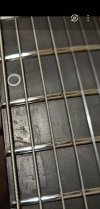It seems to me like ebony boards can vary in how problematic they are. Some are pretty temperamental with fret sprout, cracking, and an unstable neck. But some are quite fine.
What are your experiences with different ebony board guitars?
I'm thinking maybe it has to do with how much the wood was dried before being turned into a fretboard. Or just different qualities of the pieces of wood maybe.
What are your experiences with different ebony board guitars?
I'm thinking maybe it has to do with how much the wood was dried before being turned into a fretboard. Or just different qualities of the pieces of wood maybe.

